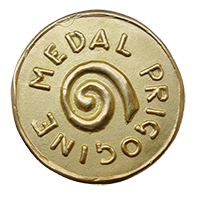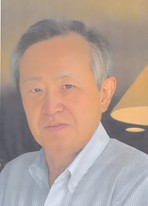 The Prigogine Award was established by the University of Siena and the Wessex Institute of Technology in 2004 to honour the memory of Professor Ilya Prigogine, Nobel Prize Winner for Chemistry.
The Prigogine Award was established by the University of Siena and the Wessex Institute of Technology in 2004 to honour the memory of Professor Ilya Prigogine, Nobel Prize Winner for Chemistry.
Ilya Prigogine
Ilya Prigogine was born in Moscow in 1917 and obtained his undergraduate and graduate education in chemistry at the Free University in Brussels. He was awarded the Nobel Prize for his contribution to non-equilibrium thermodynamics, particularly the theory of dissipative structures. The main theme of his scientific work was the role of time in the physical sciences and biology. He contributed significantly to the understanding of irreversible processes, particularly in systems far from equilibrium. The results of his work have had profound consequences for understanding biological and ecological systems.
Prigogine’s ideas established the basis for ecological systems research. The Prigogine Medal to honour his memory is awarded annually to a leading scientist in the field of ecological systems. All recipients have been deeply influenced by the work of Prigogine.
 Ichiro Aoki (formerly) Shizuoka University, Japan
Ichiro Aoki (formerly) Shizuoka University, Japan
Professor Ichiro Aoki was born in 1935, in Echizen City, in the Fukui Prefecture, in Japan. He studied at Kyoto University, from which he graduated with a BS (Physics) in 1958, a MS (Physics) in 1960 and a DS (Biophysics) in 1963.
In the period 1963‐1965, he was employed as a post-doctoral fellow of the Yukawa Memorial Foundation, and as a part‐time lecturer at the Research Institute of Fundamental Physics of Kyoto University (Biophysics). In the period 1965‐1995, he taught physics as an Associate Professor of Osaka Medical College. During the period 1995-1999, he served as a Professor of Systems Science at Shizuoka University. He has also been a part-time Lecturer in Molecular Biology and Physics at various times at Kyoto University
He has carried out theoretical research in Physics, Biophysics and Astrophysics. His key ideas of research have been the Second Law of Thermodynamics (open, far from equilibrium, irreversible), macroscopic complex systems, non-reductionistic, systemic views through ‘macroscope’ (opposite to microscope, H.T. Odum). His inter-, trans- and multi-disciplinary research combined physics, physiology, ecology, geophysics and cosmology.
More specifically, he has worked on the entropy concept in biotic systems concluding that entropy (the key concept in the Second Law of Thermodynamics) itself cannot be measured nor calculated for living systems and quantitative arguments cannot be developed. However, entropy production has been estimated numerically and discussed for various complex systems from physiology and ecology, for the first time. The view should be shifted from entropy content itself to entropy production in considering biotic systems from the viewpoint of the Second Law of Thermodynamics.
Schrödinger's "negative entropy" was numerically clarified and the maximum entropy production principle (MEP) was clarified for real processes in nature for the first time.
He introduced the Max‐Min Entropy Production Principle (MMEP) which states that entropy production in life span of living systems from individual organisms to ecosystems shows a tri-phase character: early increase, transition, later decrease with time with fluctuations. Thus, verbal ambiguous arguments on entropy related to biotic systems have become exact science. Entropy production in the earth and the planets was numerically estimated for the first time. Metabolism of water, protein and energy in human body was numerically analysed by use of Input-Output Flow Analysis which has its origin in economics. Biological evolution on the earth and all biotic systems existing in the universe are governed by MMEP while evolution of the universe from the birth to the death is governed by MEP.
The second Law of Thermodynamics (Entropy principle) is the theory of everything in all in the universe, from the holological viewpoint (holological: a jargon by E. Hutchinson , Amer. Sci. 52, 334-341 (l 964)).
Professor Aoki has authored 42 papers published in international journals, 9 reviews in Japanese publications and made 18 presentations at international conferences.
One of his most recent articles can be accessed here.
Prigogine medal award ceremony and special lecture
The 2025 Prigogine Medal was presented to Professor Ichiro Aoki of Shizuoka University, Japan during the Energy and Sustainability 2025 conference held in Ancona, Italy in September. Following the award presentation, Professor Aoki delivered a special lecture entitled "Ecological Thoughts Based on Thermodynamics". The ceremony took place on 16th September 2025 at 11:30 AM at the Faculty of Economics, Università Politecnica delle Marche.
Abstract
"The simple history of "Ecological Thoughts" are described from the age of The Ancient Greek to the 20th century. The living systems from bacteria to ecosystems and the universe are explained by use of the concept and viewpoint of Thermodynamics established in the 19th century. This consideration is on the methodology of the "holological" thought by G. E. Hutchinson in the 20th century."
Previous Prigogine Laureates
2004 Sven Jorgensen, Denmark
2005 Enzo Tiezzi, Italy
2006 Bernard Patten, USA
2007 Robert Ulanowicz, USA
2008 Ioannis Antoniou, Greece
2009 Emilio del Giudice, Italy
2010 Felix Müller, Germany
2011 Larissa Brizhik, Ukraine
2012 Gerald Pollack, USA
2013 Vladimir Voeikov, Russia
2014 Mae-wan Ho, UK
2015 Bai-Lian Larry Li, USA
2016 Brian Fath, USA
2017 João Carlos Marques, Portugal
2018 Stuart Kauffman, USA
2019 Luc Montagnier, Switzerland
2020 Diederik Aerts, Belgium
2021 Simone Bastianoni, Italy
2022 Robert Gilmore, USA
2023 Søren Nors Nielsen, Denmark
2024 Filip Meysman, Belgium
For further information about the Prigogine Awards, please contact:
Prigogine Award
Wessex Institute
Ashurst Lodge, Ashurst
Southampton
SO40 7AA, UK
Tel: +44 (0) 238 029 3223
Email:
See the following Web pages for details of the recent Prigogine Awards:
Further details of all Prigogine Awards can be found on our dedicated page: Prigogine Award

 Wessex Institute
Wessex Institute